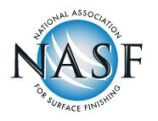The course consists of 10 lessons. Each one contains a wealth of valuable, practical information. And if you score 70 or above on the optional exam, you’ll receive 1 credit toward certification as a Master Surface Finisher. MSF is the world’s most respected – and most widely recognized – designation for finishing industry professionals. Those passing 6 course exams earn the coveted MSF designation.
Course Options
In-Person
Dates: June 4-7, 2024
Registration Deadline: June 8, 2024
Location: Atlanta, GA
Member: $900 | Non-Member: $1,200
In-Person Exam
Date: June 8, 2024
Registration Deadline: June 8, 2024
Location: Atlanta, GA
Member: $160 | Non-Member: $240
Web-Based
Dates: October: 29, 30, November: 5, 6, 12, 13, 19, 20
Registration Deadline: October 21, 2024
Member: $975 | Non-Member: $1,300
Home-Study
Member: $900 | Non-member: $1,300
Optional Exam
Member: $200 | Non-member: $300
Who Benefits:
This training program is beneficial for operators and supervisors of contract and captive shops performing zinc and zinc alloy plating. The course is also beneficial for industry sales personnel.
Goal
The goal of this course is to provide students with information related to the metallurgy and corrosion behavior of zinc coatings. Students will also learn the differences between the various zinc plating and zinc alloy plating processes, including potential problems and how to prevent and solve them.
The lessons in this course prepare students for a certification examination designed to demonstrate knowledge of technologies used in precious metals plating.
- At the conclusion of this course, attendees can expect to:
- Understand the basic behavior of zinc and zinc alloys in retarding the onset of corrosion in steel and other base metals.
- Have knowledge of the metallurgy and basic chemical principles involved in zinc and zinc alloy plating.
- Understand how barrel plating is different from rack plating.
- Know the various types of zinc plating solutions and be able to distinguish the features of each.
- Understand zinc alloy plating processes, including zinc-nickel, zinc-cobalt, tin-zinc, and tin-zinc-copper, their chemical make-up and operational conditions.
- Be prepared to take the examination, which is part of the Foundation MSF certification program.
Course Description
- 1. Electroplating Basics for Zinc Platers
- This lesson provides basic chemical, electrochemical and metallurgical background that will allow the student to make basic calculations of current density and plating times for both rack and barrel plating of zinc and zinc alloys.
- 2. Introduction-Historical Development & Applications of Zinc Coatings
- This lesson provides an introduction to zinc coatings from a historical perspective, followed by a discussion of economics, corrosion mechanisms, and methods used to apply zinc coatings (mechanical plating, electroplating, hot dip galvanizing and fake diffusion processes).
- 3. Preparing Parts for Zinc Plating & Post Plate Baking
- This lesson will provide guidance on preparing substrates for zinc plating. Covered are ultrasonic cleaning, vapor degreasing, soak cleaning, electrocleaning, descaling and acid pickling.
- 4. Cyanide Zinc Plating
- This lesson explores the chemical make-up and operational conditions for the cyanide-based zinc plating solutions used by the metal finishing industry. Special focus is given to the function of and control over individual ingredients in each process. Common contaminants and methods of removal and treatment are discussed.
- 5. Alkaline Non-Cyanide Zinc Plating
- This lesson explores the chemical make-up and operational conditions for the alkaline non-cyanide based zinc plating solutions used in metal finishing. Special focus is given to the function of and control over individual ingredients in each process. Common contaminants and possible methods of removal and treatment are discussed.
- 6. Chloride Zinc Plating
- This lesson provides chemical make-up and operational conditions for the acid chloride-based zinc plating solutions used in metal finishing. Special focus is given to the function of and control over individual ingredients in each process. Common contaminants and methods of removal and treatment are discussed.
- 7. Zinc Alloy Plating, Part 1: Zinc-Nickel
- This lesson provides chemical make-up and operational conditions for the alkaline and acidic zinc nickel plating solutions used in the metal finishing industry. Special focus is given to the function of and control over the individual components of common contaminants and possible methods of removal and treatment.
- 8. Zinc Alloy Plating, Part 2: Zinc-Cobalt
- This lesson provides chemical make-up and operational conditions for the alkaline and acidic zinc cobalt plating solutions used in metal finishing. Special focus is given to the function of and control over individual ingredients in each process. Common contaminants and possible methods of removal and treatment are discussed.
- 9. Zinc Alloy Plating, Part 3: Zinc-Iron
- This lesson provides chemical make-up and operational conditions for the alkaline and acidic zinc iron plating solutions used in metal finishing. Special focus is given to the function of and control over individual ingredients in each process. Common contaminants and methods of removal and treatment are discussed.
- 10. Chromate Conversion Coatings over Zinc and Zinc Alloys
- This lesson provides chemical make-up and operational conditions for hexavalent and trivalent chemical conversion coatings for zinc and zinc alloy deposits. A major focus is good operating practices that produce the highest level of corrosion resistance.
